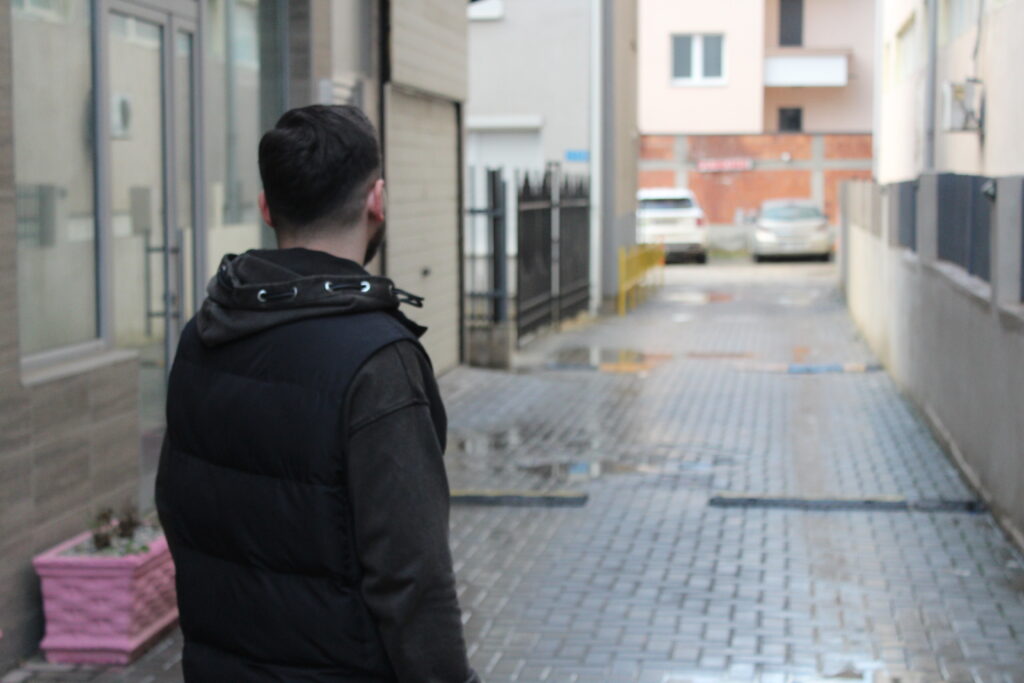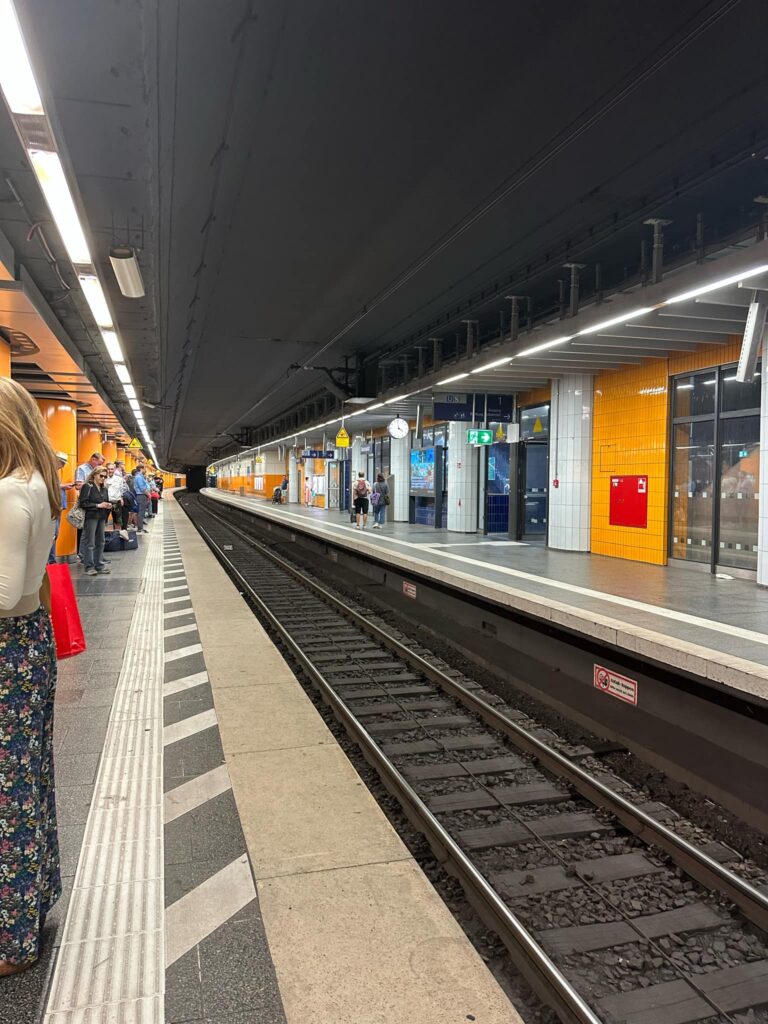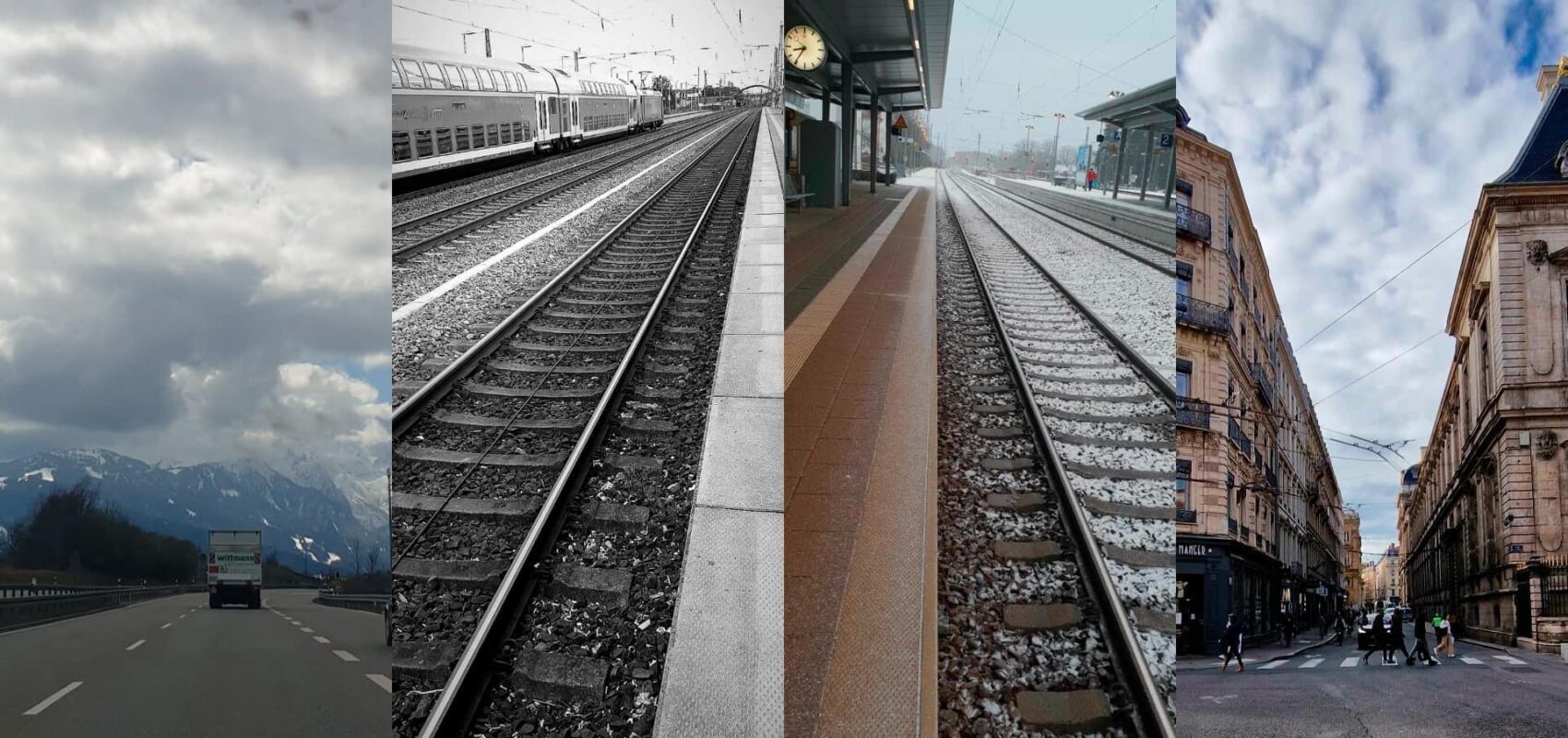Liki’s hurried walk to the ticket office reflected his first insecurities. Four days after the freedom for Kosovars to travel visa-free to Europe was officially granted, I found myself in a travel agency in Pristina, in the Dardania neighborhood. Inside the ticket office, buzzing with the noise of printers and people shouting, we were there to buy a bus ticket to Germany. My attention quickly turned to others waiting in line. Stealthy sighs. The people in line asked each other, with concern, “Have you traveled before?” I noticed Liki’s increased interest in these conversations, probably trying to quell his insecurities, since he was traveling abroad for the first time.
“They say they ask you at the border how much money you have with you,” was the chatter I clearly overheard from someone in line. Others, begrudgingly and hesitantly, engaged in the conversation, listening attentively. Liki, who wasn’t participating in the talk at first, appeared confused and concerned. But I also saw a hint of rebellion in him—a final act of defiance before he embarked on what he called the “big world” before leaving Kosovo.
I knew Liki would be gone before the visa liberalization took effect. That’s why, back in early December of last year, we agreed to keep in touch from time to time with the goal of publishing an article about his dreamy endeavour in the future.
Now 24 years old, Liki had been working as a waiter for as long as he could remember—first in Fushë Kosovë, then in Pristina. He never saw the benefit of this kind of work, despite starting at the age of 16. Even today, he talks about the low wages and uncertainty about the future. He’s told me countless times that he’s been feeling the weight of a country that offers nothing, which pushed him toward pursuing this “dream journey.”
“I’m going to Germany to see what it’s like. I’ll work there as a waiter,” he said as we hurried to the ticket office.
“I’m excited but a little scared,” he admitted. “I’ve never been abroad,” he continued softly. “But I believe I’m going to make it in Germany.”

Liki is a disillusioned young man who knows very well that the visa liberalization, implemented on January 1 of this year, doesn’t grant the right to work—only the ability to travel for tourism in the Schengen Area. Yet he refuses to label his endeavor as illegal. “They need workers, and I need work. I’m not hurting anyone,” he says, almost as if justifying himself. Then, in rancor, he launched into a story about worker exploitation in Kosovo.
“For waiters here in Kosovo, the wages aren’t good. All that talk in the last year or two about wage increases is just propaganda,” Liki told me, as if he was trying to excuse his rage. He explained that he comes from a family of five, with divorced parents, all living on below-average wages.
“I’m going to help my family… at least a little bit,” he said bluntly when the ticket agent asked for the details of his one-way ticket to Germany.
On January 5, 2024, I was with Liki, along with some of his family members, amid the commotion of travelers hurriedly loading their suitcases onto the bus. Most of the travelers were diaspora members returning after the holidays, but I had the impression that there were also Kosovars traveling for the first time.
The sound of suitcases being dragged and the voices of people trying to communicate through the chaos almost brought on a sense of melancholy. I remained quiet—I didn’t want to ask him any questions at that moment, but I did tell Liki, “When you have access to the internet, keep me updated during your trip.” We said our goodbyes as I watched the driver complete a final check of the double-decker bus departing Pristina for Düsseldorf, Germany.

Later that evening, I went to a café in Fushë Kosovë, the one where Liki had worked until two days before his departure. I met some mutual friends, but I was more interested in hearing from Liki’s former coworkers. “He made the right choice. Why not try it? It’s easier now that visas are gone,” said Agimi, the guy behind the café counter. Everyone there agreed that if someone could get them a job in Germany, they would go without hesitation.
When I got back to the apartment, I received the first message from Liki, informing me that he had just entered Croatia, sharing details of his stops and the difficulties along the way. “We waited 8 hours at the Kosovo-Serbia border,” he wrote to me, about an hour before I saw the message.
A few minutes later, he responded to my question about whether the Croatian border guards had asked him where he was going. “Yes, they asked me where I was going. I told them I was going to my uncle in Germany, and they gave me the stamp,” Liki wrote. I didn’t hear from him again until he reached Austria, where he encountered stricter border controls. “They searched all our suitcases,” he told me, adding that both he and a girl had been asked for the address where they were going to stay, “but they didn’t ask me how much money I had with me,” Liki finished the message. I thought that he was starting to feel “liberated,” as he seemed to view the stops and questions from the border guards as a kind of pressure.
On January 6, 2024, Liki reached Germany, with Düsseldorf as the final stop of the bus before heading to Köln. He left me a message saying that his uncle had met him in Düsseldorf and that everything had gone well during the trip. I asked him for his first impression of Germany before we cut off communication for a few days. “Clean, organized place, I like it,” he told me briefly, adding that with the help of his family there, he would start working immediately after arriving in Köln—a large city with over a million inhabitants, where many Albanians have also gone to find a better life. I was curious to understand how many Kosovar Albanians live in Germany, but no internet research provided the exact figure. However, according to the latest estimates from the GAP Institute—a think tank that conducts research and monitors public institutions—there are 542,000 people with a migration background from Kosovo living in Germany, of which 300,000 were born in Kosovo.
I also needed statistics from Pristina Airport. Some of their publications indicated that January 2024, compared to 2023, had seen a significant increase in flights and passengers. From 808 flights in January of last year, there were now 996 for this January. Similarly, the number of travelers had risen from 235,576 to 287,205, an increase of 21.9 percent. Unfortunately, I couldn’t find statistics on bus trips.
When Liki and I resumed contact, he told me that he had started working as a waiter and bartender in a small bar. He explained that he cycled to work, a 15-minute ride from where he was staying. Liki assured me that he was fully committed to making the most of every opportunity this job offered. However, in every discussion with him, he couldn’t help but compare it to Kosovo. For every new experience, every workday, and every conversation with his German colleagues, there was always a “this wasn’t the case in Kosovo” or “it’s better here than there.” He told me he felt respected and supported, even though he knew the job was temporary. This seemed like an important step toward fulfilling his aspirations.
Liki had a significant advantage in Germany because he understood and spoke German at a satisfactory level. He had taught himself, attending a few courses in Kosovo, and watching films in the language helped as well. “Germans appreciate it when a foreigner speaks their language,” I remember Liki telling me. This had helped him greatly in dealing with the customers he served.
In Köln, Liki stayed at his uncle’s house—a small apartment in a working-class neighborhood. He told me that the area was full of people from various nationalities, a mix of cultures living together in a big European city. Liki experienced this as a new, sometimes strange, but exciting experience. He described the café where he worked as small, with only a few tables and a regular clientele, some of whom he had already befriended. He detailed his long workdays, starting early in the morning and ending late at night.
Liki’s daily routine started before the city fully woke up. He told me he left his apartment around 6:30 in the morning, when the streets were almost empty. With a small bag over his shoulder, he would hop on his bicycle and ride through the quiet neighborhood streets to reach the café, which was about 15 minutes away. He started work at 7:00 a.m., serving local residents, office workers, and a few students. Liki handled both the bartending and waiter duties.
Life outside of work for Liki was quiet and simple. After finishing his shift, he would return to his apartment. The quiet neighborhood where he lived didn’t offer much in the way of activities after a long day of work. His routine mostly involved watching TV or talking with relatives in Kosovo. On weekends, he often walked across the large bridges over the Rhine River—a 1,230-kilometer waterway that flows through Switzerland, Germany, and the Netherlands. But to Liki, Germany felt like a country with a slow, peaceful pace, offering the stability he had long been seeking. The calm and quiet German culture was in sharp contrast to what he had left behind in Kosovo. “My mind has calmed down here,” he often told me.
Although the migration of Kosovars has often been viewed through a critical and sometimes troubling lens, the new policies on visa liberalization and Germany’s demand for workers have opened up more opportunities for people to secure work contracts and pursue their goals. Liki was doing the same, and as the weeks went by, he began to notice a gradual but lasting improvement in his financial situation. His paychecks no longer went solely to covering basic necessities; now, he had the chance to save a little. This was a new experience for him, something he hadn’t been able to do in Kosovo, where every penny had to be carefully planned.
A portion of his savings was regularly sent to his family in Kosovo, which gave Liki a deep sense of pride and responsibility. For the first time, he felt he was contributing to the betterment of his loved ones’ lives. This fulfilled him and gave him a new sense of purpose.
He was earning around 2,000 to 2,200 euros per month, all paid in cash. This was the only way he could benefit from his employment, as he didn’t have the legal right to work in Germany. His wages were given to him off the books to avoid trouble with the authorities, keeping him in a precarious situation. However, this arrangement allowed him to earn more than he could in Kosovo, where wages for similar work were significantly lower.
On April 3 of this year, Liki informed me that he had returned to Kosovo. This marked a new phase in his life, as he resumed work as a waiter in the same café in Fushë Kosovë where he had worked before, now with some savings. “I need to go again”, he told me when we met.
After spending several months in Kosovo, Liki decided to return to Germany at the beginning of August this year, but this time with an important change. The process of obtaining a work visa had become much easier for Kosovars, thanks to visa liberalization and Germany’s growing need for young foreign workers. Liki had secured a work contract and registered legally—an important step that allowed him to restart his life in Germany. He now works again in the same café in Cologne, no longer a hidden immigrant.
*Liki is the abbreviation of the character’s full name.
About the author

Halim Kafexholli completed his bachelor’s studies in journalism at the University of Pristina. Halimi worked in the magazine Prishtina Insight of BIRN Kosovo organization. He is also a beneficiary of the Human Rights Journalism Scholarship program (cycle 2018 and 2020) from Kosovo 2.0 and has worked as a journalist in the National newspaper.
Cover photo: Fatlum Sadiku
Other photos: Halim Kafexholli
This publication is supported by the European Endowment for Democracy (EED)
![]()
The views expressed in the article do not necessarily represent the views of the donor.


